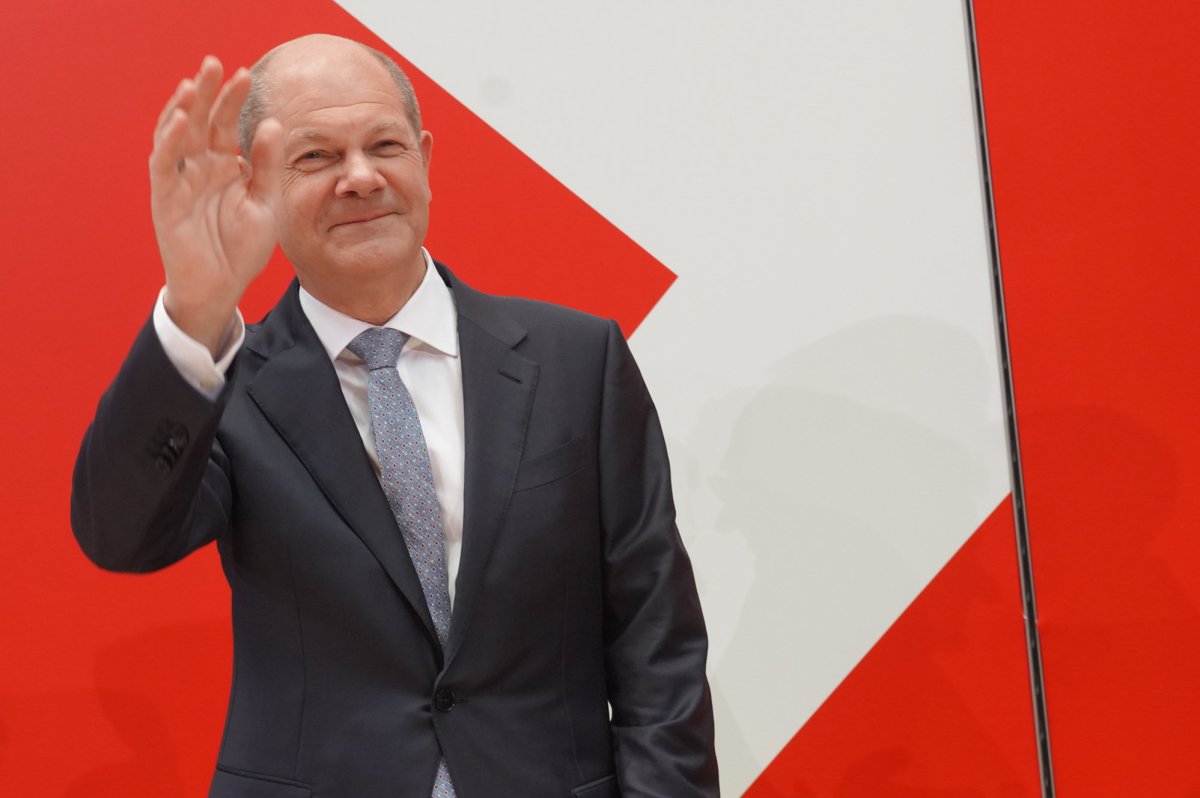A Germany under Olaf Scholz, the man most likely to succeed Angela Merkel as the country's chancellor, might have to choose between supporting China or the United States as tensions rise between the two global superpowers, a leading expert has told Newsweek.
The German finance minister has the best shot of forming a new government after leading his Social Democratic Party (SPD) to a narrow victory on Sunday's parliamentary elections. His more conservative CDU rival Armin Laschet plans to fight on.
Hans Kundnani, director of Chatham House's Europe Programme, said that the U.S. and China are becoming increasingly hawkish towards each other. Germany—which under Merkel had been able to balance relations between the two superpowers— may under Scholz face some difficult choices on who to support, the expert told Newsweek.
Since taking office, President Joe Biden has reframed the country's China policy in ideological terms as a struggle between democracies and authoritarian states, Kundnani said.
"Germany and other Europeans over time will be facing essentially a difficult choice—it will come under pressure from both China and the U.S. essentially to side with it and those pressures over time will become more difficult," Kundnani told Newsweek.
"But one has to say that the Biden administration so far has actually cut Germany quite a lot of slack, whether it's on Nord Stream II—which is obviously a separate issue that's not China—or the China investment deal that Merkel pushed through just before she left office," he added.
"It's not as if the Biden administration has put Germany under a whole lot of pressure on that, unless you think and you could argue that AUKUS is in part a consequence of the fact that Europeans weren't very keen to align themselves with the U.S. and so the U.S. has gone off and done AUKUS with the Australians and the Brits."
Ariane Reimers, Senior Policy Fellow at the Berlin-based Mercator Institute for China Studies (MERICS), said Scholz might pursue a more business-oriented, pragmatic China policy, mostly following the path of Merkel.
"But he would have to integrate positions of the Greens and the Liberals who both have a strong critical approach on China, especially regarding human rights issues," Reimers told Newsweek.
"A Scholz-led coalition would likely be less transatlantic-orientated than a government under a chancellor Armin Laschet, even though in its manifesto, the SPD has called for a 'restart' of the transatlantic relationship," she added.
"But no matter who governs Germany, no political party has an interest to subscribe to an overly confrontational China policy since any cold-war or close-to-cold-war situation could harm German economic interests."
In recent years, former Chancellor Merkel was able to successfully balance a relationship with China and a turbulent U.S. administration. She visited China 12 times during her tenure as chancellor—more than any other European leader.
Kundnani expects her legacy to continue when it comes to China relations.
"The Merkel consensus will continue essentially across a whole bunch of different areas and that's partly because the differences between the candidates—Scholz and Laschet —the differences between them and the differences between them and Merkel are just not that significant," Kundnani told Newsweek.

He added that on top of that, the parties in the coalition will have to compromise on many policies, including on China, which will ultimately lead to them "canceling each other out."
Kundnani said the SDP is not significantly more hawkish on China than the CDU, and maybe even less hawkish. He said that the Greens present the biggest hope for change in Germany-China relations, but regardless of which ministries they end up controlling in the coalition, China policy will be determined by the chancellery.
Over her tenure as chancellor, Merkel was not very publicly vocal on China's human rights record, which Kundnani says is likely to continue under Scholz.
"There's been an approach on this that goes back to Gerhard Schroeder when he was Chancellor, which is to deal with these things in private with the Chinese, because German politicians will claim this is more effective. Merkel hasn't been very vocal about this so I don't see a huge change one way or the other, but I definitely don't expect Schlotz to be dramatically more outspoken on these issues than Merkel was."
But he said that such comments tended to be "purely rhetoric" and it was military and economic issues "where the rubber hits the road" on China-Germany relations.
"The real issues are what you actually do on policy, whether it's German economic policy towards China or the whole set of questions around security of the Indo-Pacific—there's a German frigate that just arrived in Australia today. And the question of whether you do more of those types of things and how you do those types of things and there again, I just don't see there will be a big difference."
Uncommon Knowledge
Newsweek is committed to challenging conventional wisdom and finding connections in the search for common ground.
Newsweek is committed to challenging conventional wisdom and finding connections in the search for common ground.
About the writer
Jack Dutton is a Newsweek Reporter based in Cape Town, South Africa. His focus is reporting on global politics and ... Read more
To read how Newsweek uses AI as a newsroom tool, Click here.








